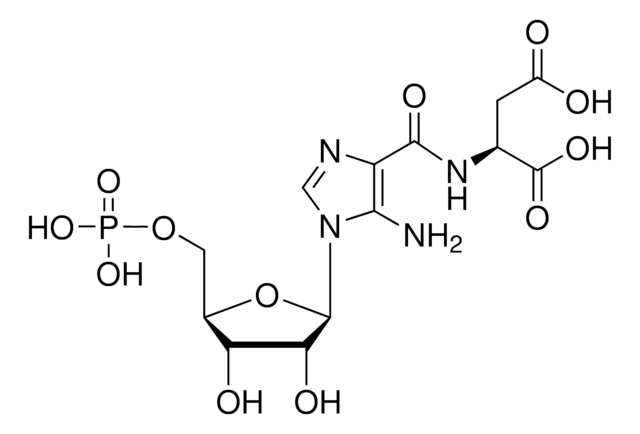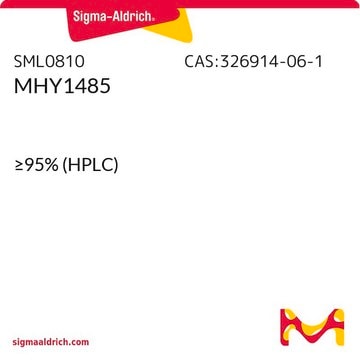A1393
5-Aminoimidazole-4-carboxamide-1-β-D-ribofuranosyl 5′-monophosphate
≥93%
Synonym(s):
AICAR monophosphate, N1-(β-D-5′-Phosphoribofuranosyl)-5-aminoimidazole-4-carboxamide, NSC 283955, NSC 292227, ZMP
About This Item
Recommended Products
Quality Level
Assay
≥93%
form
powder
mol wt
338.21 g/mol
storage temp.
−20°C
SMILES string
O[C@H]1[C@@H](O)[C@H](N2C=NC(C(N)=O)=C2N)O[C@@H]1COP(O)(O)=O
InChI
1S/C9H15N4O8P/c10-7-4(8(11)16)12-2-13(7)9-6(15)5(14)3(21-9)1-20-22(17,18)19/h2-3,5-6,9,14-15H,1,10H2,(H2,11,16)(H2,17,18,19)/t3-,5-,6-,9-/m1/s1
InChI key
NOTGFIUVDGNKRI-UUOKFMHZSA-N
Looking for similar products? Visit Product Comparison Guide
General description
Application
Biochem/physiol Actions
In humans, 5-Aminoimidazole-4-carboxamide-1-β-D-ribofuranosyl 5′-monophosphate (AICAR) is found to be accumulated in numerous metabolic diseases. It can increase the endurance of sedentary mice. AICAR exhibits antiproliferative effects. It can induce apoptosis of aneuploid cells.
Storage Class Code
11 - Combustible Solids
WGK
WGK 3
Flash Point(F)
Not applicable
Flash Point(C)
Not applicable
Personal Protective Equipment
Certificates of Analysis (COA)
Search for Certificates of Analysis (COA) by entering the products Lot/Batch Number. Lot and Batch Numbers can be found on a product’s label following the words ‘Lot’ or ‘Batch’.
Already Own This Product?
Find documentation for the products that you have recently purchased in the Document Library.
Customers Also Viewed
Our team of scientists has experience in all areas of research including Life Science, Material Science, Chemical Synthesis, Chromatography, Analytical and many others.
Contact Technical Service
















